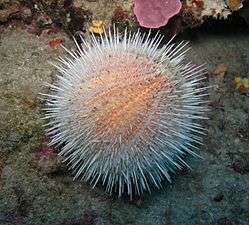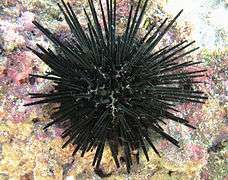Echinacea (animal)
| Echinacea | |
|---|---|
 | |
| Echinus melo | |
| Scientific classification | |
| Kingdom: | Animalia |
| Phylum: | Echinodermata |
| Class: | Echinoidea |
| Superorder: | Echinacea Claus, 1876 |
| Orders | |
|
(See text) | |
The Echinacea are a superorder of sea urchins. They are distinguished by the presence of a rigid test, with ten buccal plates around the mouth, and solid spines. Unlike some other sea urchins, they also possess gills. The group is a large one, with species found worldwide.
Echinacea are part of Animalia (kingdom), Echinodermata (phylum), Echinozoa (subphylum), Echinoidea (class), Euechinoidea (subclass), Carinacea (infraclass).
Child taxa
According to World Register of Marine Species:[1]
- Order Arbacioida (Gregory, 1900) -- 1 family and 2 fossiles
- Order Camarodonta (Jackson, 1912)
- Infraorder Echinidea (Kroh & Smith, 2010) -- 5 families
- Infraorder Temnopleuridea (Kroh & Smith, 2010) -- 2 families and 2 fossiles
- Order Stomopneustoida (Kroh & Smith, 2010) -- 2 families and 1 fossile
- Family Glyphopneustidae Smith & Wright, 1993 †
.jpg)
Temnopleurus toreumaticus,
a Temnopleuridea
Stomopneustes variolaris,
a Stomopneustoida
References
- ↑ "Echinacea WoRMS taxon details". World Register of Marine Species. Retrieved 29 July 2014.
- Barnes, Robert D. (1982). Invertebrate Zoology. Philadelphia, PA: Holt-Saunders International. p. 980. ISBN 0-03-056747-5.
- Kroh, A.; Smith, A.B. (2010). "The phylogeny and classification of post-Palaeozoic echinoids". Journal of Systematic Palaeontology. 8 (2): 147–212. doi:10.1080/14772011003603556.
This article is issued from
Wikipedia.
The text is licensed under Creative Commons - Attribution - Sharealike.
Additional terms may apply for the media files.